-
About
- About Listly
- Community & Support
- Howto
- Chrome Extension
- Bookmarklet
- WordPress Plugin
- Listly Premium
- Privacy
- Terms
- DMCA Copyright
- © 2010-2025 Boomy Labs

 Sun Young Kim
Sun Young Kim
Listly by Sun Young Kim
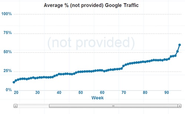
According to NotProvidedCount.com, the website which tracks the data of not provided keywords, the average percentage of 'not provided' Google traffic is around 60% at the time of writing this post. And according to the same website, the not provided traffic will reach 100% on 29th April, 2014 .
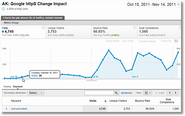
It is astonishingly common that we are asked to analyze the impossible. In perhaps a career-limiting move I'm going to try to do that today (and for a controversial topic to boot!). In this post about an important Google change, I want you to focus less on the data and focus more on the methodology.
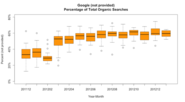
It has been over three months since Google announced the (not provided) update that would hide search referral keywords for organic traffic. Since (not provided) results only show up while logged in to Google, the increase to over 60 million Google plus users - and estimates of 400 million by the end of 2012 - indicates that the problem of search referral data is not going away anytime soon.

Earlier this week, Google revealed it would be encrypting all search data, rendering website owners unable to see search term information previously offered through the "referrer" system. While Google had encrypted the data two years ago for searches performed by users signed in to their Google account, and then earlier this year for any searches [...]

Google recently released news that it is now moving to encrypt all organic search activity. This means that analytics programs will no longer be able to report on keyword terms that drive organic traffic from Google, instead noting the data as being "not provided."

Google recently released news that it is now moving to encrypt all organic search activity. This means that analytics programs will no longer be able to report on keyword terms that drive organic traffic from Google, instead noting the data as being "not provided."

On Monday, searchengineland.com wrote about the -25% organic visibility drop of expedia.com. We provided the guys from SEL with some data and a few screenshots of our software, the Suite. Now, I want to provide you with a deeper analysis for a closer look at what may have really happened.

It appears the Google search spam team has a busy year planned. Matt Cutts recently attended SMX west and gave details on what updates they have planned for 2013. And guess what? There will be an update of both Google Panda and Penguin this year. Surprised? Probably not.
![The Future of SEO and What it Means for Inbound Marketing [SlideShare]](http://media.list.ly/production/55306/485547/qb1tugmvctm9ciifym-lmtl72ejkfbmt4t8yenimkbvvk0ktmf0xjctabnaljim9_185px.png)
A few years ago, if you asked me what SEO came down to, I would have said two things: keywords and inbound links. Keywords placed properly in your content boosted your site's relevancy to a given search, and inbound links from other sites acted as a vote of confidence for your site's authority on the search topic.

When it comes to the evolving SEO industry, we've all talked about what we wish will change, what changed in 2013 that will spill over into 2014, and what will become more important, but there is one big question that still needs to be asked: What are your predictions for the changes we'll see in 2014?

It appears the Google search spam team has a busy year planned. Matt Cutts recently attended SMX west and gave details on what updates they have planned for 2013. And guess what? There will be an update of both Google Panda and Penguin this year. Surprised? Probably not.
![The Future of SEO and What it Means for Inbound Marketing [SlideShare]](http://media.list.ly/production/55306/485552/qb1tugmvctm9ciifym-lmtl72ejkfbmt4t8yenimkbvvk0ktmf0xjctabnaljim9_185px.png)
A few years ago, if you asked me what SEO came down to, I would have said two things: keywords and inbound links. Keywords placed properly in your content boosted your site's relevancy to a given search, and inbound links from other sites acted as a vote of confidence for your site's authority on the search topic.

When it comes to the evolving SEO industry, we've all talked about what we wish will change, what changed in 2013 that will spill over into 2014, and what will become more important, but there is one big question that still needs to be asked: What are your predictions for the changes we'll see in 2014?

SEO is.... alive! In this post we're sharing this highly rated presentation to our Digital Marketing 2014 Summit from regular contributor and author of our SEO guide, James Gurd who explained how SEO has evolved and will continue to evolve.
By Stephen Kenwright published February 2, 2014 CMI readers know that it's possible to measure the effectiveness of content marketing efforts without keyword data - something we've had since 2011 to think about - but it shouldn't just be a case of damage limitation for people who work with web analytics.
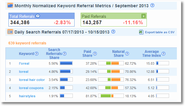
In late 2011, Google announced an effort to make search behavior more secure. Logged-in users were switched to using httpS from http. This encrypted their search queries from any prying eyes, and kept from being passed on to websites the users visits after seeing search results.

In late 2011, Google announced an effort to make search behavior more secure. Logged-in users were switched to using httpS from http. This encrypted their search queries from any prying eyes, and kept from being passed on to websites the users visits after seeing search results.

If you work in Web marketing or the SEO space, you have probably been hearing the buzz around Google's change to their reporting of keyword data. Today, we are seeing "keyword not provided" 100 percent of the time for organic search results.

I have written about the importance of collecting and analyzing your visitor data and using it to improve your site and create a better user experience. The tool that is the most popular for doing this is the Google Analytics tool.
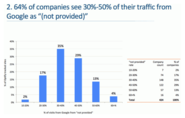
Secure search now obscures up to 60% of search visits, making it virtually impossible to determine which keywords are driving your site traffic. Appearances of the dreaded (not provided) have been steadily increasing. Now the default Google Analytics reporting is nearly worthless for understanding the impact and opportunities for your SEO program.
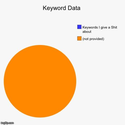
So Google have gone 100% (not provided) on us, I'm sure you can't wait to send your clients their next monthly report, which is going to look something like this... Until a few weeks ago the Not Provided Count was hovering around the 40-45% mark but things have really started to get out of hand recently especially when I noticed this tweet from Steve Webb.

Taking the example of using rich snippets for hotels In my experience, many local businesses miss out on the opportunity of SEO since they don't focus their efforts in the use and implementation of structured data. Rich snippets on SERPs attract the attention of users and this means that the CTR is improved than the ones of your competitors.

Q: Why doesn't my site show rich snippets? I added everything and the test tool shows it's ok. A: Google does not guarantee that Rich Snippets will show up for search results from a particular site even if structured data is marked up and can be extracted successfully according to the testing tool.
Structured data is an important element of successful search engine optimization.
